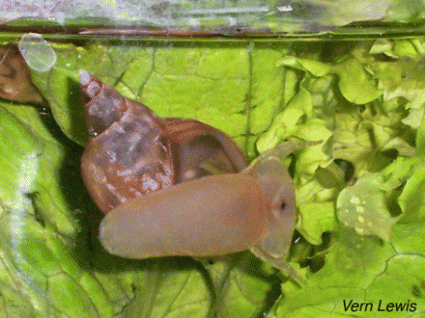February 18, 2011 report
First evidence of sleep in snails

(PhysOrg.com) -- Scientists in Canada noticed pond snails spent around 10 percent of their time attached to the side of their tank with their tentacles partly withdrawn, their shells hanging away from their bodies, and with their feet symmetrical and relaxed. The researchers decided to do some experiments to find out if the snails were asleep or just resting, and their results provide the first evidence that gastropods sleep.
There is no single characteristic that defines sleep but sleep is deduced from a number of factors such as being unresponsive and hard to rouse, and adpoting a characteristic position. To determine if their snails did sleep, Associate Professor Richard Stephenson and Dr Vern Lewis of the University of Toronto observed pond snails (Lymnaea stagnalis) in their tanks and cataloged their behavior.
The researchers reasoned that if the snails were sleeping rather than merely resting, they would respond less to stimulation and would withdraw their bodies into their shells sluggishly when prodded with a metal rod, for example. They tested the responses of active and apparently sleeping snails to being tapped on the shell, prodded with a rod, and having their appetites simulated by exposing them to sucrose solution.
The results of their experiments showed that the active snails responded twice as quickly to physical stimulation and seven times faster to appetite simulation than the immobile snails, so it appears that the resting snails were actually asleep rather than just relaxing.
The researchers then monitored eight snails over a period of 79 days to monitor patterns of sleeping and see if the amount of light exposure affected their behavior. They found that the sleep patterns followed a two to three day period rather than a 24 hour cycle with clusters of around seven bouts of sleeping over a 13-15 hour period followed by over 30 hours of uninterrupted activity. They did not need to make up for lost sleep, a process known as sleep rebound.
Dr Stephenson said snails do not sleep at a regular time as most other animals do, and they need very little sleep because their lifestyles are not mentally demanding, so they probably do not need tight controls over their sleeping patterns.
Sleep is believed to be important to many biological processes such as memory formation, but there are still many unanswered questions. The researchers think a study of sleep in simple animals such as pond snails could be useful in aiding our understanding of cellular functions in sleep.
The paper was published in the Journal of Experimental Biology.
More information: Behavioural evidence for a sleep-like quiescent state in a pulmonate mollusc, Lymnaea stagnalis (Linnaeus), First published online February 9, 2011. Journal of Experimental Biology 214, 747-756 (2011) doi: 10.1242/jeb.050591
© 2010 PhysOrg.com















